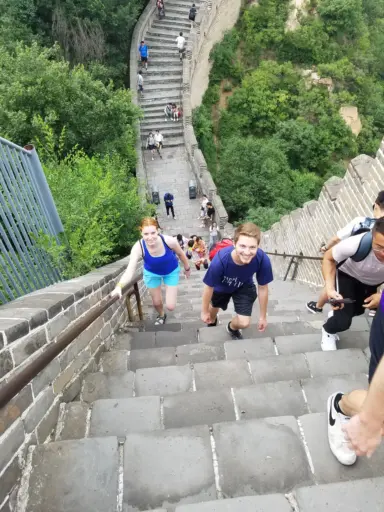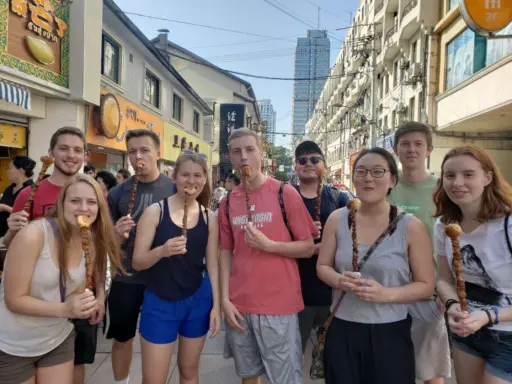Business is booming in China. The country with the world’s fastest-growing economy is also the largest exporter and home to some of the planet’s most ambitious public works projects.
Emerging as a world-leader in manufacturing and sustainable power, China offers a wide array of opportunities for tomorrow’s engineers—if they are comfortable living and working in a country with vastly different culture and traditions than they may be used to in the United States.
“China is one of the world’s biggest markets,” says Amanda Hammatt, director of international engineering studies and programs at the University of Wisconsin-Madison. “A lot of American companies have plants in China and, for our engineering students, having some basic knowledge of the culture is extremely valuable.”
 Engineering students Sarah Gerarden and Mason Murphy climb the Great Wall of China during the 2018 summer study abroad program. Photo credit: Peter Hotvedt.
Engineering students Sarah Gerarden and Mason Murphy climb the Great Wall of China during the 2018 summer study abroad program. Photo credit: Peter Hotvedt.
UW-Madison engineering students gain that knowledge firsthand, thanks to a unique UW-Madison summer international experience at the Zhejiang University in Hangzhou, China. Now in its 10th year, the program gives students the opportunity to fulfill engineering degree requirements while developing crucial international skills that will help them become tomorrow’s leaders.
“Our economy is global and our students need to have a leg up in making global connections and working in global environments,” says John Pfotenhauer, a professor of mechanical engineering who has been involved with the program every year since its inception in 2008.
And there’s no replacement for experience overseas if a student wants to thrive in the global job market.
“I learned to put things in perspective,” says Sofia Noesjovich, a rising sophomore in industrial and systems engineering who participated in the program during summer 2018. “Being in a new country can be exciting, but it is also easy to feel like an outsider. The experience allowed me to have a new level of empathy and to feel comfortable communicating with people who come from different cultures.”
Becoming familiar with people and cultures different from their own enables engineers to work more effectively on diverse teams and in today’s global landscape.
Unfortunately, very few engineers gain that valuable perspective—only about 5 percent of U.S. engineering students study abroad—oftentimes for fear that time overseas will be an insurmountable interruption to their demanding coursework requirements.
At UW-Madison, the College of Engineering encourages international experiences—and roughly 11 percent of students annually take advantage of the opportunity.
“There’s a huge misperception among engineering students,” says Hammatt, who has helped facilitate the China program since 2008. “There is no reason that they have to get behind in their degree. The reason we have an international office is to facilitate opportunities for engineering students to take engineering courses abroad.”
During the eight-week long summer program in China, students take classes taught by UW-Madison professors. The courses seamlessly integrate into their degree requirements and allow engineering students the opportunity to travel overseas and still graduate on time.
And when those students do graduate, they’re well-prepared to enter the job market.
“China is a standout on a resume; it’s very attractive to employers,” says Hammatt.
For some of the students, their summer in China is not only a first experience abroad, but the trip to Hangzhou is their first time traveling on an airplane. Although they occasionally experience culture shock during the first few days, such as the realization that most restaurant waiters don’t accept tips or that squat toilets are common, most of the students quickly learn to roll with the punches.
“I always tell students that part of this experience is not just learning about China, it’s about learning about yourself,” says Laura Grossenbacher, director of the technical communication program, who has taught classes in China for the majority of the program’s 10 years. “You learn that sometimes things don’t live up to your expectations and you learn not to crumble when they don’t.”
 Engineering students sample Chinese street food during the 2018 summer study abroad program. Photo credit: Peter Hotvedt.
Engineering students sample Chinese street food during the 2018 summer study abroad program. Photo credit: Peter Hotvedt.
Such life lessons complement what the students learn in class. Throughout the session, the students work through six credits of engineering coursework, including Grossenbacher’s technical communication class (EPD 397).
That class encourages the students to immerse themselves in Chinese culture. For example, in addition to a term project consisting of a report on an engineering challenge in their chosen field, the students deliver a cultural presentation about some aspect of Chinese history or daily life. For the cultural presentations, the students often work in groups with graduate students from the Zhejiang University—an opportunity for both the Americans and Chinese to work on their communication skills.
In summer 2018, one group’s cultural presentation about pre-World War II history precluded a visit to the memorial at Nanjing, where the Imperial Japanese Army massacred hundreds of thousands of Chinese civilians over a six-week period during the 1937 Sino-Japanese war.
“The students get much more than engineering, they get a cultural history,” says Grossenbacher. “After visiting Nanjing, students said, ‘I understand there’s some tension between Chinese people and Japanese people and it goes way back.’”
The engineering coursework also includes field trips, which reinforce concepts from the lectures and allow students to witness firsthand the scope and scale of Chinese industry.
“In thermodynamics we learned all about power plants, so it was really cool to see all the giant heat exchangers and cooling towers in real life instead of as symbols in a textbook,” says third-year mechanical engineering major Christopher Seliski.
For the bulk of the program, students stay in dormitories at Zhejiang University in central Hangzhou, a city of roughly 10 million people that is known as one of the most beautiful cities in China thanks to its lush parks, historical landmarks and scenic mountain views. The city center surrounds West Lake—a popular destination for boating and sightseeing.
But the students don’t spend all of their time cloistered within the confines of their dorms; with myriad opportunities for exploration, the travelers immerse themselves in all that China has to offer.
Students have visited the famed Terracotta Army, interred with the first Emperor of China, Qin Shi Huang, in roughly 210 B.C. as guards for the monarch in the afterlife. They’ve walked along the Great Wall of China and taken in the sights at Qiando Hu, a manmade reservoir known as “Thousand Island Lake.”
The students also adventurously sample the local cuisine, gamely tasting Chinese delicacies like duck tongue and scorpions.
By exploring places somewhat off the beaten path, the students learn adaptability. Outside the major metropolitan areas, very few people speak English, so the travelers need to be resourceful to understand and to make themselves understood.
“Communication errors are inevitable,” says Stephanie Staed, a third-year student majoring in chemical and biological engineering, whose favorite adventure was a river boat cruise through the mountains of Guilin. “We all needed to quickly problem solve and make the best out of tough situations.”
And those problem-solving skills will serve the students well—no matter whether they go on to work in China or if they remain in the United States for the rest of their careers.
“The people in the China program represent a really special slice—they’re adventurous, they’re willing to take risks and they develop a flexibility of mind,” says Grossenbacher. “These are people who are going places.”